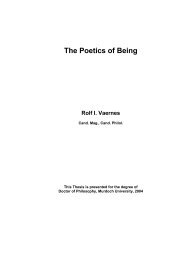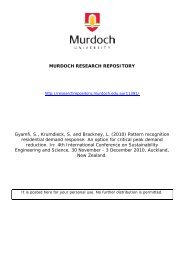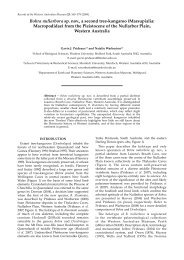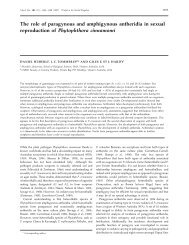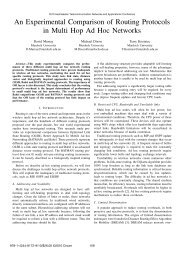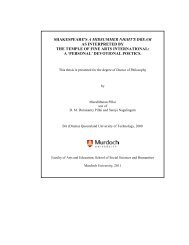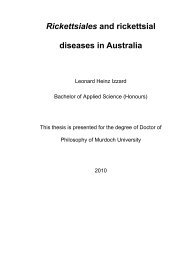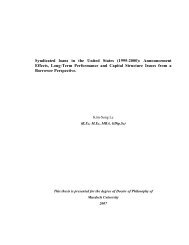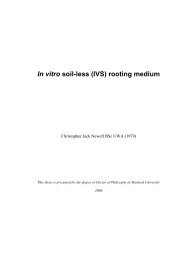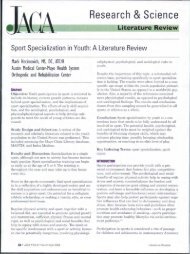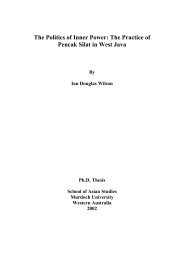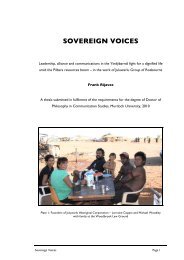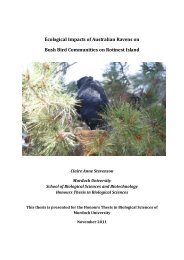National Review of School Music Education - Murdoch Research ...
National Review of School Music Education - Murdoch Research ...
National Review of School Music Education - Murdoch Research ...
Create successful ePaper yourself
Turn your PDF publications into a flip-book with our unique Google optimized e-Paper software.
The disadvantage <strong>of</strong> the generalist ‘one-class-one-teacher’ model <strong>of</strong> education is that one teacher<br />
now has difficulty managing the size and intensity <strong>of</strong> the modern curriculum (House <strong>of</strong> Commons,<br />
UK, 1989). Generalist teachers in America have been reported failing to treat music seriously as a<br />
subject, but as a ‘frill’ for entertainment, something which brings together a school community in<br />
the ‘inculcation <strong>of</strong> traditions, fitting with school productions for holidays’ (Bresler, 1993, p. 11).<br />
Lepherd (1994) made a similar claim that Australian generalist teachers are likely to see music as a<br />
subject just for fun. He described the phenomenon <strong>of</strong> primary generalist teachers feeling<br />
‘inadequately equipped to provide music education for children’ as a ‘recognised problem for 25<br />
years or more, yet it has not been rectified on a national basis’ (p. 6). Both Bartle (1968) and<br />
Covell (1970) recommended that specialist teachers be deployed to teach music in primary schools.<br />
The main argument for this position centred upon the complex nature <strong>of</strong> musical understanding,<br />
and Plummeridge (1991) is a key advocate for this line <strong>of</strong> thinking. In his report on music<br />
education, he makes the observation that teachers must be authorities on subject matter in relation<br />
to their learners, commenting that:<br />
All music teaching calls for subtle and refined musical judgement. To think that a person can<br />
rely entirely on books, materials or instruction manuals to provide the basis <strong>of</strong> an adequate<br />
pedagogy is quite mistaken. Indeed as Kodály insisted, teaching is not only a skilful but also<br />
an artistic activity; it depends on the individual being able to transform materials and bring<br />
them to life encounters with children. (p. 71)<br />
The deployment <strong>of</strong> specialist teachers is sometimes problematic. They may be viewed as providers<br />
<strong>of</strong> release time for generalist teachers who <strong>of</strong>ten are not aware <strong>of</strong> the content and are not<br />
appreciative <strong>of</strong> the value <strong>of</strong> music programmes (Colley, 1991). This could contribute to lowering<br />
the status <strong>of</strong> music specialists (Lamdin, 1992). Askew (1993) points out the problem <strong>of</strong> specialist<br />
music teachers isolating music from the rest <strong>of</strong> the curriculum. Despite their best intentions,<br />
H<strong>of</strong>fer and H<strong>of</strong>fer (1987) note that they have not been able to integrate every music lesson into<br />
the teaching programme <strong>of</strong> every class they teach. But the generalist teacher would be able to<br />
include significantly more music lessons within a week (Mills, 1989; 1993), a practice that has been<br />
found to be significant in improving the level <strong>of</strong> student achievement (Runfola & Rutkowski,<br />
1992). It is also argued that generalist teachers have an advantage over specialists since they would<br />
know the children in their class better than any specialist possibly could (Mills, 1993). The holistic<br />
manner <strong>of</strong> the primary classroom programme could not be maintained in a specialist environment,<br />
as specialists provided a single and possibly narrow view <strong>of</strong> musical experience, removed from the<br />
rich experiences that classroom teachers might provide throughout the years (Glover & Young,<br />
1999). Sustaining this argument is the belief that an arts education should be a holistic and<br />
generalist one, which provides access for all students through integrating the arts into the general<br />
school curriculum, and making them more relevant to real-life experiences (Mills, 1989; Smith,<br />
1992; Glover & Ward, 1993; Livermore, 1998; Livermore & McPherson, 1998; Glover & Young,<br />
1999; McPherson & Dunbar-Hall, 2001).<br />
The coming together <strong>of</strong> five art forms as an Arts Learning Area (sometimes referred to as a Key<br />
Learning Area or KLA) in Australian education made possible the integration <strong>of</strong> the arts. It has the<br />
potential to support multi-arts experiences and artistic processes rather than methods, and to make<br />
teaching <strong>of</strong> the arts more accessible to generalist teachers (Comte, 1993; Stowasser, 1993,<br />
McPherson, 1995; Paterson, 1998; Bolton, 2000). However, there is also evidence that this<br />
construct <strong>of</strong> integrating the arts has blurred the distinctiveness <strong>of</strong> each art discipline in favour <strong>of</strong><br />
less complex language and content (Stevens, 1993; McPherson, 1995; Jeanneret, 1999; Watson,<br />
1999). In many schools it is reported that time allocation has been reduced due to the pressure <strong>of</strong><br />
meeting common outcomes for each <strong>of</strong> the creative arts areas (Boughton, 1993; Eltis, 1997). Other<br />
complaints include replacing sequential learning with sets <strong>of</strong> activities (Paterson, 1998), and that<br />
planning is more difficult for generalist teachers (McPherson, 1997).<br />
The most common solution to the specialist or generalist debate is a compromise – in the form <strong>of</strong><br />
consultancy. Plummeridge (1991) advocates the use <strong>of</strong> a specialist teacher in an apprenticeship<br />
model in the form <strong>of</strong> a mentoring programme, whereby teachers worked alongside specialists to be<br />
trained in a partnership. Askew (1993) and Lepherd (1994) endorse this form <strong>of</strong> consultancy,<br />
which encourages team planning, and a sharing <strong>of</strong> knowledge and enthusiasm to devise a more<br />
effective music programme. Gamble (1998) notes the advantage <strong>of</strong> having specialists helping<br />
generalist teachers, who, when they became comfortable teaching music, would reinforce it in their<br />
classrooms, and might eventually take over the programme completely.<br />
The second proposed model <strong>of</strong> consultancy advocated the advisory role that is to be shared<br />
between several schools, with the aim to provide teachers with ongoing support. This system (now<br />
not available) operated in New South Wales government schools through district Creative Arts<br />
FINAL REPORT 13



